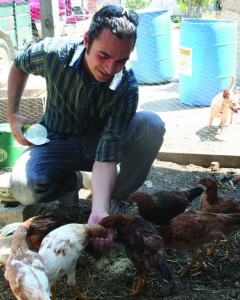
From a small plot of land on the edge of Tulare, Danny Ochoa Leon is trying to change the world, or at least the way people work together.
Fed up with the growing inequity in our modern lives and the widening distance between neighbors, Leon is working on a new way of doing things, a method of network building that produces genuine communities that leave no one out.
“It started with a comment from my mother,” Leon said. “She said, she wished she could grow enough food to give away, and I said, ‘OK.’ She ended up growing 200 tomato plants in her front yard. We’d just let people take the tomatoes away.”
A group of friends formed around those plants, and soon they were building gardens for each other at their own homes. Friends of friends started asking for garden help, and soon an after-school program became involved. The idea had taken root.
“From there it’s grown to a project for anyone who wants to do a sustainable project,” Leon said. “We’re trying to develop projects that rely on no one. We want it to be independent and survive.”
Food is free
That notion of free tomatoes has become the Sustainable Communities Project of Tulare — scpprojecttulare.org — and one of its current projects, one typical of the group, is distributing self-watering, pre-planted gardens within a neighborhood at no charge.
“The idea is we’ll build 10 of these and pick a street. The only stipulation is you keep it in the front yard and give your neighbors food,” Leon said. “This way, we get our presence. People get the idea it’s OK to go up and eat. That’s going to help with food and resources and networks.”
From there, a sense of prideful custodianship seems to develop, and as the neighbors interact and cooperate with one another a genuine feeling of community pervades what was once just another subdivision. Leon also hopes these projects will help build respect between those involved.
“When you come to know your neighbors, you’re not indifferent to their suffering. What’s important to us is creating the sense of community,” he said, describing a future where these neighborhoods develop seed banks, larger growing spaces and greenhouses, and tool libraries in the homes of those who live there, and eventually leadership councils.
“We start out initiating the community,” he said. “They can sustain themselves. I love networks. We evolved in group settings. When we work together, we all benefit.”
Banking time
Recently, the Project volunteers have been working on the creation of a time bank, a way individuals throughout the area can trade their services through an exchange, and a tool library that anyone can use free of charge to complete their own projects, a nascent household furnishings loaner program.
Growing movement
Leon, who grew up in Tulare and attended school there, lived for a time in the Philippines and in Los Angeles. He returned to Tulare three years ago, setting up on a property his family has occupied for the last 20 years. That oversize lot surrounded by fields has turned into a sort of sandbox for sustainable projects, serving as both a workshop and an example. Along the road is the Sustainable Communities Project sign directing those who become interested to the group’s Facebook page — more than 1,600 members strong at facebook.com/scptulare.
Shoulder to shoulder with a giveaway seed bank are a pair of small enclosed bookshelves where passersby can share books they’re ready to pass on and find new titles for free. Anyone who happens by is also free to pick produce from the various gardens spread through the yard.
Anyone with a sustainability project is welcome to participate in the group, either in person or online, with SCP Tulare providing a means of linking the various endeavors together and creating new community leaders in the process.
“I envision many, many communities. They have the network of communities,” Leon said. “We want to serve as an example and help people become leaders.”
